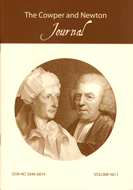If you have visited John Newton’s attic study in what is now the Old
Vicarage at Olney, you will have seen these two texts which he kept on
the wall as reminders to himself:
Since thou wast precious in my sight, thou hast been honourable. Isaiah
43:4
BUT
Thou shalt remember that thou wast a bond-man in the land of Egypt, and the
LORD Thy God redeemed thee. Deuteronomy 15:15
Why these two verses in particular? A little light is shed on this in
his diary for 1767. Lord Dartmouth had the vicarage enlarged for
Newton. While the builders were on site, William Cowper and Mary
Unwin arrived from Huntingdon and moved in with the Newtons at their
temporary address.
On 20 October, after the Tuesday night prayer meeting, which
began with an exposition from Pilgrim’s Progress, Newton wrote in
his diary, ‘Preparing to remove to the vicarage.’
The extra activity was all too much for the ladies. The following
day both Mary Newton and Mary Unwin fell ill. ‘Alarmed with a
double illness,’ wrote John, ‘my dear and Mrs U’, adding, ‘Enabled
in some measure to put all into the Lord’s hands.’
His diary continues: ‘Thursday 22. Busied in setting to rights my new
study. O may the Lord bless me in it. Lecture: Deuteronomy15:15.’
This was the usual Thursday night church Bible study, or lecture,
but he interrupted his series on Acts to preach from this text in
Deuteronomy. Through the excitement of the provision of a newly
furbished home, he still kept himself in check, meditating on his
undeserved gifts… ‘Thou shalt remember thou wast a bondman…
and the Lord Thy God redeemed thee.’
Friday 23: Removed the family today – slept in the vicarage. It was a busy
day, little time for myself in secret.
Saturday 24: Some thoughts of the Lord’s goodness in settling me peaceably
in my new house. Reading, writing, etc.
Sunday 25: Isaiah 43:4; Daniel 6:23. In the evening had our first meeting in
the best parlour. My heart hoped for a time of liberty, but to me it seemed
otherwise.
In his morning sermon on Isaiah 43:4, Since thou wast precious in
my sight, thou hast been honourable, he began, ‘After mentioning the
disobedience and stupidity of Israel in terms which might lead us to expect
heavier judgment, we find new promises and declarations of grace. This
is the Lord’s usual method – he visits his people’s transgressions with a
rod, but it is the discovery [revealing] of his love that chiefly softens and
breaks their hearts.’
An ‘anniversary man’, who celebrated regularly the birthdays of
his wife, himself, their wedding day, his re-birth during the storm at
sea and his dedication for the ministry, this move into freely-provided
accommodation gave him cause for reflection and thanksgiving. The
following Friday, the 30 October, he reserved ‘as a solemn day of
prayer to entreat the Lord’s blessing on my new habitation’.
Perhaps it was as a result of this day of prayer, with his two recently
preached sermons on Isaiah 43:4 and Deuteronomy 15:15 fresh in his
mind, that he had these particular texts written on his attic study wall
as ‘markers’ of the Lord’s dealings with him over that past week.
(This article previously appeared in the John Newton Project Newsletter,
2004)

